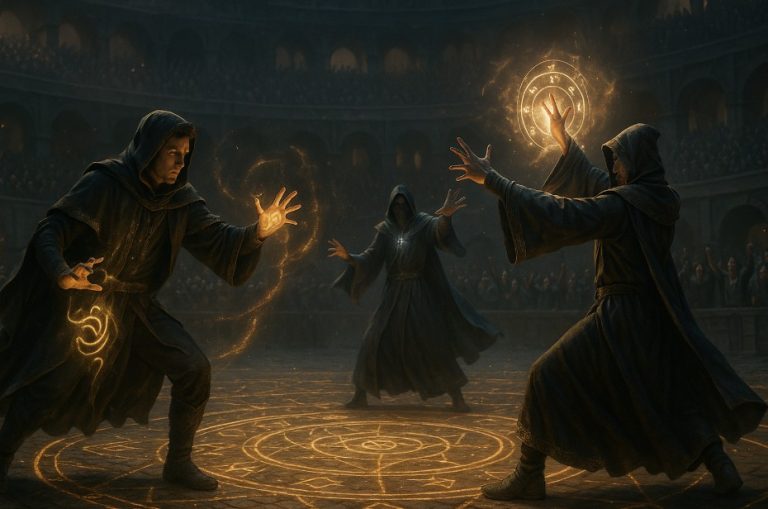What Is The Mus Card Game And Where Did It Originate?
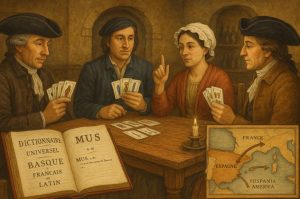
Mus is a traditional Spanish card game with deep roots in the Basque Country. The earliest documented reference dates back to 1745, found in a trilingual dictionary by Manuel Larramendi. Since then, it has evolved into one of the most widely played card games across Spain and Hispanic regions.
Mus is not just a game but a cultural ritual, often played in clubs, universities, and local gatherings. The game spread internationally through Basque emigrants, especially to countries such as the United States and Australia.
While its precise linguistic origin remains unclear, it may derive from the Basque word “musu” (kiss), the Latin “musso” (to keep silent), or the French “mouche” (fly).
How Do You Set Up The Mus Card Game?
Mus is played by four players in two opposing teams. Partners sit opposite each other and play proceeds in a counter-clockwise direction. The game requires a Spanish deck of 40 cards, which excludes eights, nines, tens, and jokers.
To begin a game:
- A dealer is selected randomly for the first round
- The dealer shuffles the cards, and the player to their left cuts the deck
- Each player receives four cards, one at a time, starting from the right of the dealer
- Once dealt, the deck is set aside and play begins with the player to the dealer’s right
Player roles rotate every game, which allows each player to serve as the first to speak at some point.
What Are The Main Rules Of Mus?
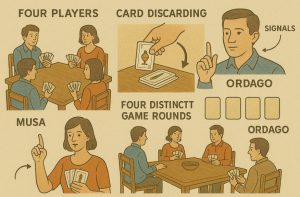
Mus follows a structured set of rules that revolve around strategy, communication, and bidding. The game is played in pairs, with partners seated opposite each other, and turns proceed in a counter-clockwise direction.
The foundation of the game lies in four primary rounds Handia, Txikia, Pareak, and Jokoa, each focusing on different card values or combinations. Understanding these rounds and how players interact within them is critical to playing Mus effectively.
Game Format and Objective
Each hand in Mus is made up of four rounds, each evaluating different card strengths:
- Handia (Biggest): Players aim to have the highest value combination.
- Txikia (Smallest): The goal is to hold the lowest card combination.
- Pareak (Pairs): Evaluates matching cards such as pairs, three-of-a-kinds, and two-pairs.
- Jokoa (Game): Requires a hand with a total value of 31 or more. If no player qualifies, the round is replaced by Puntua.
The overall objective is to be the first team to accumulate the required number of points to win a game (usually 30), then go on to win sets called vacas, and eventually the match.
Discarding and The Mus Phase
Before the rounds begin, players have the option to discard cards and draw new ones. This phase is known as Mus, and it is only activated if all four players agree. The process is simple but strategic:
- Each player states either “Musa” (to agree to discard) or “Musik ez” (to reject)
- If all players say “Musa,” each may discard and redraw up to all four cards
- After redrawing, another vote is held to determine if another Mus phase will occur
- If any player says “Musik ez,” the discard phase ends and the game proceeds to the four rounds
Players must carefully consider whether discarding will improve their hand without giving away information to opponents.
Bidding System
One of the most strategic components of Mus is its bidding system. During each round, players may:
- Pass (Paso): Choosing not to initiate a bid
- Bid (Enbido): Initiating a bet, usually starting at two points
- Raise (Beste Bi or more): Increasing the bid amount
- Accept or Reject: Opponents may accept, counter, or refuse the bid
Bids are resolved in the scoring round, not during play. A bid that’s accepted becomes pending, and the winner of that round claims the full bet value. If a bid is refused, the bidder wins a single point by default.
A special, high-stakes bid called “Ordago” ends the entire game if accepted and won. This is the ultimate risk-reward mechanic and is used sparingly, often to bluff or solidify a clear win.
Use of Legal Signals
Mus uniquely allows players to communicate with partners using non-verbal gestures called keinuak. These signals are standardised and must be agreed upon before play begins.
They can include gestures like biting the lip, raising eyebrows, or winking—each corresponding to specific hand information.
While this adds a cooperative dimension, it also opens the game to deception, observation, and counter-strategies. The rules explicitly prohibit using false or unauthorised signals.
Game Progression and Winning
- A partida (match) is made up of games (joko), and each game is played until a team reaches 30 points
- Typically, winning three games earns one vaca, and three vacas win the match
- Scoring uses beans, coins, or markers, and players keep track using a combination of one-point and five-point markers
Regional variations may alter some rules, such as scoring limits or how certain hands are ranked. It is always recommended to clarify house rules before starting.
How Does The Gameplay Unfold In Mus?
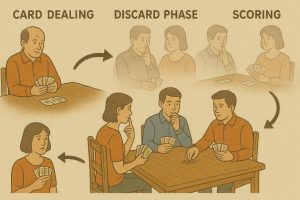
Gameplay in Mus is deeply strategic and relies heavily on verbal interaction, subtle cues, and partner coordination. Unlike many other card games, Mus involves limited physical card play after the initial deal. Most of the game occurs through dialogue, bids, and psychological tactics.
Initial Card Distribution
At the beginning of each hand, the dealer shuffles and distributes four cards to each player, one at a time, starting with the player to their right.
The deck is then set aside, and the speaking order begins from the right of the dealer (known as Esku). This player has a strategic advantage, as ties are usually resolved in favour of the earliest speaker.
Each game’s dealer changes in rotation, ensuring all players eventually get a chance to be Esku.
The Mus (Discard) Phase
The first decision after cards are dealt is whether to enter the Mus phase, where players may discard unwanted cards and draw replacements. This phase is collaborative and only occurs if all four players agree.
Sequence of the discard phase:
- Voting: Players take turns stating “Musa” or “Musik ez”
- Discarding: If all agree, players discard up to four cards
- Redrawing: The dealer distributes new cards
- Repeat Option: Another Mus vote may take place, unless a player declines
Strategically, players may break the discard phase early if they feel confident about their current hand or want to limit the opponent’s ability to improve their cards.
The Four Rounds Of Play
After the discard phase ends, gameplay moves to the four central rounds. Each round has unique objectives and is played in the same speaking order.
1. Handia (Biggest):
Players bid based on having the highest-value combination. Kings rank highest, followed by Knights and Jacks. A hand like King-King-Knight-7 is considered strong.
2. Txikia (Smallest):
Here, players aim to have the lowest combination. Aces are the lowest, making a hand like Ace-Ace-5-Knight favourable. Because it reveals weak cards, players often avoid bidding aggressively in this round.
3. Pareak (Pairs):
Before the round begins, players declare whether they have matching cards. Valid combinations are:
- One Pair (Pareak)
- Three of a Kind (Medial)
- Two Pairs (Dupleak)
If neither team has pairs, the round is skipped.
4. Jokoa or Puntua (Game or Point);
Players who have a card total of 31 or more participate in Jokoa. If no one qualifies, the round becomes Puntua.
- Jokoa scoring is based on face values (face cards = 10, Ace = 1)
- Hands like King-King-Ace-Jack total exactly 31 and are highly desirable
The rounds are played consecutively, with players choosing to pass, bid, or raise in each. Once all rounds conclude, the game moves to scoring.
Scoring Phase
In the scoring phase, all accepted bids are resolved:
- Winning players show their hands
- Scores are calculated per round
- Any unaccepted rounds award one point to the team with the better hand
- Additional bonus points are granted in Pareak and Jokoa/Puntua rounds
Scoring is cumulative until one team reaches the target (usually 30 points). If an Ordago was accepted during the hand, that outcome overrides all other scoring, and the game ends immediately in favour of the winning team.
The gameplay in Mus, while methodical, is highly dynamic. Each phase is an opportunity to bluff, calculate odds, and collaborate silently with a partner—all of which contribute to the game’s depth and enduring popularity.
What Happens In Each Of The Four Mus Rounds?
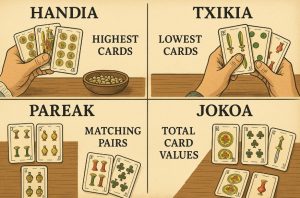
The core of the Mus card game lies in its four sequential rounds: Handia, Txikia, Pareak, and Jokoa (or Puntua if no player qualifies for Jokoa).
Each round serves a unique purpose and evaluates different qualities of the players’ hands. Understanding how each round functions is essential for strategic play and accurate bidding.
Handia – Competing For The Highest Cards
In the first round, Handia, teams compete to see who holds the highest combination of cards. The Spanish deck ranks cards in this order from highest to lowest: King, Knight, Jack, 7, 6, 5, 4, 3, 2, Ace.
Key features of the Handia round include:
- Players evaluate their four cards based on the highest-ranking cards
- The player or team with the highest single card or strongest high combination wins
- In the variant with eight Kings, threes are treated as Kings, making powerful combinations more likely
If both teams decide to bid during Handia, the round becomes highly competitive. Players will often raise the stakes if they hold combinations like King-King-Knight-Knight or better.
Txikia – Competing For The Lowest Cards
The second round, Txikia, is the inverse of Handia. Here, the objective is to hold the lowest possible card combination. Aces are the lowest, followed by 2s, 3s, and so on.
Considerations in this round:
- Players often avoid aggressive bidding here, as doing so may reveal a weak hand for future rounds
- A hand such as Ace-Ace-4-Knight is considered strong for Txikia
- Like Handia, the order of cards is used to compare lowest to highest within each player’s hand
Many experienced players use this round tactically by passing to avoid revealing hand strength unless they are sure of a win.
Pareak – Matching Cards
Pareak, the third round, evaluates matching card values in a player’s hand. Before it begins, players declare whether or not they have any pairs. This declaration phase adds an element of transparency and can influence subsequent bids.
Valid matching combinations include:
- Pareak (One Pair): Two cards of the same value
- Medial (Three of a Kind): Three cards of the same value
- Dupleak (Two Pairs): Two pairs of different values
Notably, in Mus, two pairs (Dupleak) rank higher than three of a kind, which is unusual compared to other card games like poker.
If only one team has pairs, the round is played by default in their favour, while the other team scores nothing.
In case of a tie in combination type, the higher-ranked cards determine the winner. If both players have the same combination, the speaking order (starting with the Esku) is used to resolve the tie.
Jokoa – Total Card Value 31 Or Higher
The fourth and final round is Jokoa, which tests whether players can form a hand with a total value of 31 or more. The valuation of the cards is as follows:
- Face cards (King, Knight, Jack) = 10 points
- Number cards = face value
- Aces = 1 point
To qualify:
- Players must declare if their hand meets or exceeds 31
- If no player qualifies, the round is replaced by Puntua
The most powerful hand in Jokoa is exactly 31, such as King-Knight-Jack-Ace, which often wins the round outright unless matched by another 31, in which case the speaking order decides.
Variants of Mus that include eight Kings or Aces make it more likely for players to qualify for Jokoa.
Special hands like Royal 31 may also exist in regional versions, granting automatic victories in this round under specific conditions.
Puntua – When No Jokoa Is Possible
If no player qualifies for Jokoa, the round becomes Puntua, where players compete for the highest possible total below 31. The maximum value in Puntua is 30, and it is calculated using the same card values as Jokoa.
Though less prestigious than Jokoa, Puntua still awards a valuable point, which can be crucial in tight games. The round operates identically in terms of bidding and scoring.
How Is Scoring Handled In Mus?
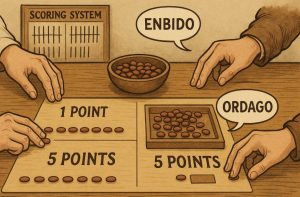
Scoring in Mus is multifaceted, combining bidding outcomes, bonus point opportunities, and a unique bean-based tracking system.
The objective is to reach a pre-agreed total number of points (usually 30) before the opponents, with rounds contributing various amounts based on how bids and bonuses are resolved.
Scoring System Structure
Each match of Mus is composed of:
- Games (Joko): Played to 30 points by default
- Vacas (Sets): The team that wins three games earns one vaca
- Match: Typically, the team that wins three vacas is declared the match winner
Points are tracked using beans, coins, or other markers, usually laid out in a pool in the centre of the table. To reduce clutter, one side may represent 1-point beans and the other 5-point beans, simplifying the count.
Bid Resolution
At the end of each hand, bids from each round are resolved in the order the rounds were played. The points awarded depend on:
- Whether the bid was accepted
- Whether the team won the round
- The number of points originally bid
Unaccepted bids still score a default one point for the bidder. Accepted bids that are won award the full point value to the winning team. Bids that are lost yield zero points for the team that initiated them.
Bonus Points From Rounds
Beyond bidding, certain rounds offer bonus points based on the quality of a team’s hand. These apply whether or not bidding occurred and can be decisive in close games.
Bonus Points Breakdown:
| Round | Bonus Criteria | Points Awarded |
| Pareak | One Pair | 1 point |
| Three of a Kind (Medial) | 2 points | |
| Two Pairs (Dupleak) | 3 points | |
| Jokoa | Each player who qualified | 2 points |
| Exact value of 31 | 3 points | |
| Puntua | If Jokoa not played, round winner | 1 point |
These bonus points are awarded in addition to any bidding outcomes, making Pareak and Jokoa/Puntua especially important for maximising scores.
Special Bidding: Ordago
The Ordago is a high-risk, all-in bet that, if accepted and won, instantly ends the entire game in favour of the bidding team, regardless of the current score. If an Ordago is lost, the bidding team forfeits the game immediately.
This mechanic introduces intense psychological gameplay. Teams often use Ordago to bluff or close a game when they hold overwhelmingly strong hands. However, a failed Ordago can turn the tide in an otherwise even match.
Ending The Game
The scoring phase ends once one team reaches the agreed game total (commonly 30 points). If this happens mid-scoring (e.g., after Pareak), the remaining rounds are skipped, and the current game concludes. The progression to vacas and match conclusion then follows.
Players must strategically manage both aggressive bidding and subtle score accumulation across rounds to outpace opponents before they can mount a comeback.
What Are The Common Strategies For Winning Mus
Winning in Mus is about tactical bidding, teamwork, and bluffing. Since it’s rare to win all four rounds with a single hand, teams often divide responsibility between rounds.
Some effective strategies include:
- Focusing on winning the third and fourth rounds, which offer bonus points
- Breaking the discard phase when both teammates have playable Jokoa or Pareak hands
- Using legal gestures to signal card strengths
- Bidding aggressively only when coordinated with a partner
- Forcing opponents into high-risk Ordago situations
Players must weigh each round’s potential against the possibility of overexposing their hand or partner’s position.
How Are Signals Used In Mus And Why Are They Important?
Unlike many card games, Mus allows players to pass predefined signals (keinuak) to communicate with their partners. This feature makes the game both highly collaborative and strategically complex.
Common signals include:
- Biting the lower lip: pair of Kings
- Poking out the tongue: pair of Aces
- Tilting the head: one Pair
- Raising eyebrows: Two Pairs
- Winking: total 31
- Lifting shoulders: values of 30, 29, 28 respectively
- Closing eyes: bad hand
- Touching earlobe: Royal 31
Players must master these signs subtly to avoid detection. At the same time, watching opponents for these signals becomes an essential part of gameplay.
Common Keinuak (Signals) And Meanings:
| Gesture | Meaning |
| Biting bottom lip | Pair of Kings |
| Poking out tongue | Pair of Aces |
| Tilting head | One Pair |
| Raising eyebrows | Two Pairs |
| Winking | 31 total |
| Lifting both shoulders | 30 total |
| Lifting right shoulder | 29 total |
| Lifting left shoulder | 28 total |
| Closing eyes | Bad hand |
| Touching earlobe | Royal 31 |
Correct use of keinuak creates cohesion between partners and helps avoid unnecessary bidding mistakes. However, if opponents catch the signal, it can also lead to tactical counter-moves.
How Do Regional Variations Affect The Mus Card Game?
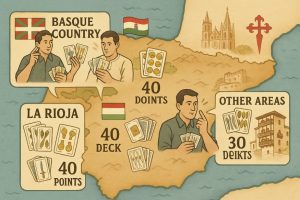
Mus has many local adaptations, especially between northern Spain and other regions. These affect both scoring and gameplay.
Common variations include:
- Playing to 40 points instead of 30
- Using 22 beans instead of 16
- Using threes as Kings and twos as Aces
- Adjusted rules for Royal 31 recognition
- Regional sign differences and custom signals
Some regions allow more expressive gameplay, while others enforce strict traditional signals. When playing with a new group, it is advised to clarify house rules before starting.
What Makes Mus Different From Other Traditional Card Games?
Several aspects distinguish Mus from other card games. It’s primarily verbal, played in fixed teams, and relies heavily on signalling and social interaction. Unlike poker or blackjack, Mus has a structured flow with four specialised rounds and layered scoring.
Its key differences include:
- Team-based format rather than individual play
- Use of legal, non-verbal communication
- Round-specific hand objectives (not a single best hand)
- Deep cultural heritage and regional rules
- No central pot or monetary stakes by design
These elements create a game that balances skill, strategy, memory, and communication, offering a unique experience not found in most Western card games.
Conclusion
The Mus card game remains a cherished cultural pastime in Spain and beyond. Its enduring appeal lies in its unique combination of strategy, partnership, and social engagement.
Whether played casually among friends or competitively in international tournaments, Mus continues to offer a distinctive experience that blends intellect, intuition, and interaction.
FAQs
What type of deck is used in the Mus card game?
Mus uses a 40-card Spanish deck without 8s, 9s, or jokers.
Can you play Mus with three or more than four players?
No, the game is strictly designed for four players in two teams.
What does “Ordago” mean in Mus?
“Ordago” is an all-in bet that, if accepted and won, ends the game instantly in favour of the bettor’s team.
How long does a typical Mus game last?
A single game can take 20–30 minutes, but a full match with multiple games may take 1–2 hours.
Is Mus difficult to learn for beginners?
Yes, due to its verbal nature and reliance on subtle strategies, it can be challenging for beginners without guided practice.
What is the best strategy for winning the “Jokoa” round?
Aim for a total card value of exactly 31 using combinations of face cards and aces. Understanding card values is key.
Are there online platforms to play Mus?
Yes, several digital platforms and mobile apps offer online versions of Mus, often adhering to regional rules.






